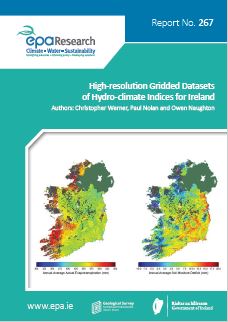Research 267: High-resolution Gridded Datasets of Hydro-climate Indices for Ireland
Authors: Christopher Werner, Paul Nolan and Owen Naughton
Summary: This report describes the application of numerical weather prediction (NWP) simulations to develop high-quality, long-term, gridded climate datasets of hydro-climate variables for Ireland, covering the period 1981–2016.

Identifying Pressures
Key stakeholders in water resource management, such as the Office of Public Works (OPW), Irish Water, the Environmental Protection Agency (EPA) and Geological Survey Ireland (GSI), share a common challenge in managing and protecting the aquatic environment, particularly in the face of climate variability, land use and demographic change, pollution and the demand for natural resources. These challenges are exacerbated by a warming climate, which is expected to result in an increase in drought and flooding events in Ireland. The EPA Research Programme specifically calls for support for development of the analysis of the fundamental processes that drive the rate and extent of climate change. Such analysis is necessary to provide the evidence base to inform relevant national policymakers, planners and stakeholders of potential climate-related issues and enable the development of pre-emptive mitigation strategies as called for under the National Climate Change Adaptation Framework (NCCAF). However, the datasets required for such research have not been available in Ireland
Informing Policy
Under the Water Framework Directive (WFD), the state is responsible for protecting and maintaining groundwater bodies and catchment areas and ensuring the long-term sustainability of water resources. Hydro-climate variables such as evapotranspiration and soil moisture conditions are crucial factors in ensuring water sustainability, understanding groundwater recharge, agronomic management and the management of flood and drought. The research and datasets resulting from this project will assist Ireland to meet its obligations under EU directives such as the WFD.
The knowledge gained, and hydro-climate datasets generated, through this research will contribute towards the long-term goal of mitigating and adapting to climate change and developing a climate-resilient Ireland by 2050, as set out in the EPA Climate Research Strategy 2014–2020. To facilitate climate change policy, a greater understanding of the primary processes driving energy and water exchanges within the hydrological cycle is required for hydro-climate trend analysis and prediction.
This research will inform climate change policy through the provision of long-term high-resolution datasets of key hydro-climate meteorological variables – a fundamental foundation for the interpretation of climate change trends in Irish hydro-climatology.
Developing Solutions
The research presents an important data resource for Irish researchers, policymakers and industry by providing, for the first time, high-resolution gridded datasets of hydro-climate variables. It is envisaged that the datasets will lead to a better understanding not only of the physical climate system but also of the interaction between climate and Irish society. In addition, it is envisaged that the datasets will be used as a basis for more-focused hydro-climate impact studies. To promote the use of the data and enhance climate research in Ireland, the datasets are made publicly available to researchers, policymakers, the general public and Irish industry through the Irish Centre for High-End Computing (ICHEC) ERDDAP server.
This study has produced high-resolution gridded datasets of hydro-climate variables, including:
- reference evapotranspiration;
- actual evapotranspiration (five drainage classes);
- soil moisture deficits (five drainage classes);
- Standardised Precipitation Index for various intervals.
In addition, the evapotranspiration and soil moisture deficit datasets were improved by incorporating the Teagasc Indicative Soil Drainage Map, resulting in a more accurate representation of actual soil conditions throughout the country.
https://www.epa.ie/media/epa-2020/publications/research/Research_267_Thumbnail[1].jpg